Robert Baillie was a Church of Scotland minister who became famous as an author and a propagandist for the Covenanters.
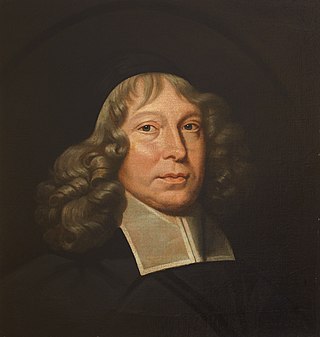
Samuel Rutherford was a Scottish Presbyterian pastor and theologian and one of the Scottish Commissioners to the Westminster Assembly.
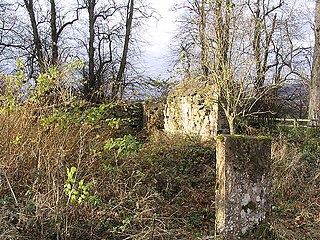
David Calderwood was a Church of Scotland minister and historian. Calderwood was banished for his nonconformity. He found a home in the Low Countries, where he wrote his great work, the Altare Damascenum. It was a serious attack on Anglican Episcopacy. Patiently and perseveringly Calderwood goes over the whole system, referencing the Bible, the Fathers, and the Canonists. Calderwood lived to see the principles for which he had suffered, and which he had defended, in complete ascendency. He was present at the Glasgow Assembly in 1638, and saw episcopacy and the high church liturgy swept away. He breathed his last at Jedburgh, a fugitive from his parish of Pencaitland; and they laid him in the churchyard of Crailing, where the first years of his ministry were spent.
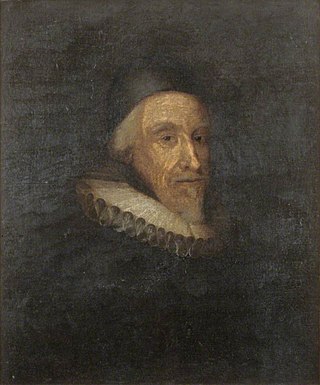
Andrew Cant (1584–1663) was a Presbyterian minister and leader of the Scottish Covenanters. About 1623 the people of Edinburgh called him to be their minister, but he was rejected by James I. Ten years later he was minister of Pitsligo in Aberdeenshire, a charge which he left in 1638 for that of Newbattle in Midlothian. In July of that year he went with other commissioners to Aberdeen in the vain attempt to induce the university and the presbytery of that city to subscribe the National Covenant, and in the following November sat in the general assembly at Glasgow which abolished episcopacy in Scotland. In 1638 Cant was minister of Pitsligo in Aberdeenshire. In 1640 he was chaplain to the Scottish army and then settled as minister in Aberdeen. Though a staunch Covenanter, he was a zealous Royalist, preaching before Charles I in Edinburgh, and stoutly advocating the restoration of the monarchy in the time of the Commonwealth. Cant's frequent and bitter verbal attacks on various members of his congregation led in 1661 to complaints laid before the magistrates, in consequence of which he resigned his charge.
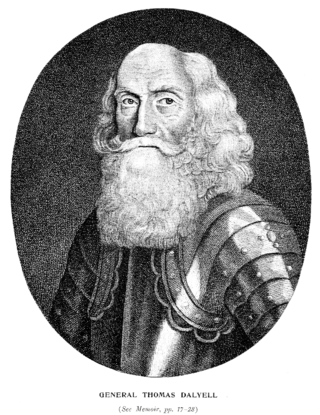
Sir Thomas Dalyell of The Binns, 1st Baronet (1615–1685) was a Scottish Royalist general in the Wars of the Three Kingdoms, also known by the soubriquets "Bluidy Tam" and "The Muscovite De'il".
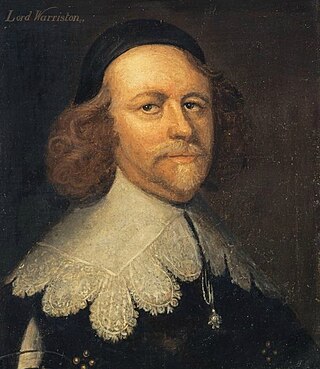
Archibald Johnston, Lord Wariston was a Scottish judge and statesman.

Robert Blair was a Scottish presbyterian minister who became a Westminster Divine and Moderator of the General Assembly of the Church of Scotland in 1646, after failing to emigrate to Boston in 1636. Born in Irvine in 1593, the sixth son of John Blair of Windyedge, a merchant-adventurer and cadet of Blair, and Beatrix Mure of the Rowallan family, he gained an MA at the University of Glasgow in 1612 and became regent there in 1615. When the episcopalian John Cameron was appointed Principal, Blair resigned and went to Ireland, to become minister of a Presbyterian congregation at Bangor, County Down. He was ordained for it by Robert Echlin, Bishop of Down and Connor, Blair was "very careful to inform... of what accusations had been laid against me of disaffection to the civil powers, whom he was the use of the English liturgy nor Episcopal government.... I declared my opinion fully to the Bishop at our first meeting... [who] said to me, 'I hear good of you, and will impose no conditions on you'". Echlin, however, turned against him. In September 1631, he was suspended from his ministry and on 4 May 1632 deposed. Though bent on emigrating to New England, the ship in which he and other ministers sailed was driven back by weather, a sign, Blair thought, that his services were still required at home. He dodged an order for his arrest by escaping to Scotland and was admitted to the Second Charge of Ayr in July 1638. After periods in Scotland and Ireland, he accompanied the Scottish army to England in 1640 and helped to negotiate the 1641 Peace of Ripon. In 1646, Blair was elected Moderator of General Assembly, then Chaplain-in-Ordinary to King Charles I. He was also on a committee endeavouring in 1648 to get Cromwell to establish "a uniformity of religion in England". He was summoned to London by Cromwell in 1654, but excused himself on grounds of ill health. On the establishment of episcopacy he was removed from his charges in September 1661, confined to Musselburgh, then to Kirkcaldy for three and a half years, and then to Meikle Couston, Aberdour, Fife, where he died on 27 August 1666 and was buried.
Robert Douglas (1594–1674) was the only minister of the Church of Scotland to be Moderator of the General Assembly five times.
James Hamilton (1600–1666) was a 17th-century Scottish minister of the Church of Scotland, later active in Ireland until deposed from his living.
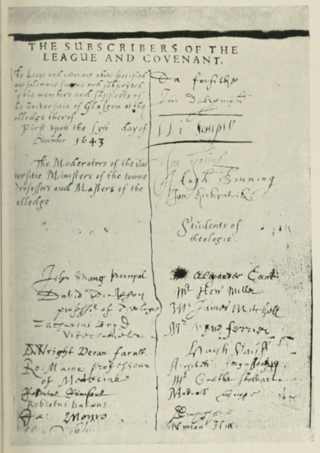
John Strang (1584–1654) was a Scottish minister and Principal of Glasgow University. He was a signator to the National Covenant of 1638.
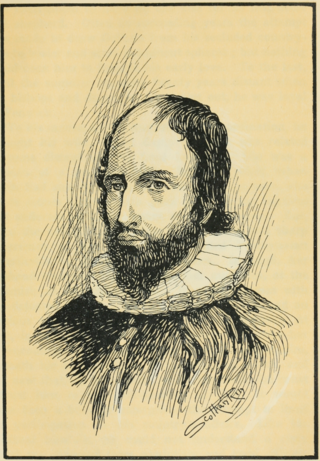
William Guthrie (1620–1665) was a Scottish Covenanter minister and author. He was the first minister of Fenwick parish church in Ayrshire, Scotland. He is known primarily for his book on assurance, The Christian's Great Interest.
Andrew Gray (1633–1656), was a Scottish divine. Gray was baptised on 23 August 1633. He was the son of Sir William Gray of Pittendrum, and Egidia Smith. He graduated from St Andrews University with an M.A. in 1651. He was licensed as a minister in 1653 and called on 5 September. He was ordained by the Protesters on 3 November 1653 but his ministry was a short one. He died on 8 February 1656.
John Nevay was a Scottish Covenanter. He was the nephew of Andrew Cant, minister of Aberdeen. He graduated with an M.A. from King's College, Aberdeen, in 1626. He worked as tutor to George, Master of Ramsay. He was licensed by the Presbytery of Dalkeith 14 October 1630 on the recommendation of that of Alford, but left its bounds a fortnight after. He was admitted about 1637 and appointed in 1647 a member of committee to revise the Psalter. He was present at Mauchline Moor in opposition to the royal army in June 1648. He was subsequently pardoned by Parliament on 16 January 1649. Nevay was appointed a commissioner by Parliament for visiting the University of Aberdeen 31 July 1649. He was active in raising the western army in 1650, and in 1651 a prominent supporter of the Protesters. In 1654 he was named by the Council of England on a committee for authorising admissions to the ministry in the province of Glasgow and Ayr. On 23 December 1662 he was banished by the Privy Council from His Majesty's dominions and went to Holland, where he died in 1672, aged about 66.

John Livingstone was a Scottish minister. He was the son of William Livingstone, minister of Kilsyth, and afterwards of Lanark, said to be a descendant of the fifth Lord Livingston. His mother was Agnes, daughter of Alexander Livingston, portioner, Falkirk, brother of the Laird of Belstane.
John Brown, of Wamphray, church leader, was probably born at Kirkcudbright; he graduated at the university of Edinburgh 24 July 1630. He was probably not settled till 1655, although he comes first into notice in some highly complimentary references to him in Samuel Rutherford's letters in 1637. In the year 1655 he was ordained minister of the parish of Wamphray in Annandale. For many years he seems to have been quietly engaged in his pastoral duties, in which he must have been very efficient, for his name still lives in the district in affectionate remembrance. After the restoration he was not only compelled by the acts of Parliament of 1662 to leave his charge, but he was one of a few ministers who were arrested and banished, owing to the ability and earnestness with which they had opposed the arbitrary conduct of the king in the affairs of the church. On 6 November 1662 he was sentenced to be kept a close prisoner in the Tolbooth of Edinburgh, his crime being that he had called some ministers ‘false knaves’ for keeping synod with the archbishop. The state of the prison causing his health to break down, he was banished 11 December from the king’s dominions, and ordered not to return on pain of death. He went to Holland. In 1676 Charles II urged the States-General to banish him from their country, a step which they refused to take. For a few years he was minister of the Scottish church in Rotterdam, and shortly before his death, which occurred in 1679, he took part in the ordination of Richard Cameron.
James Durham was the eldest son of John Durham of Easter Powrie, north of Dundee. He was educated at University of St Andrews, and betook himself to the life of a country gentleman. While visiting his mother-in-law in the parish of Abercorn, he came under profound religious impressions in consequence of a sermon by Melvill, minister of Queensferry. Joining in the Civil War, he was promoted captain, and seriously exhorted and led the devotions of his company; this being noticed by Professor Dickson, he was induced to prepare himself for the ministry, a resolution which was hastened by two narrow escapes on the battlefield. He graduated M.A.. He was licensed for the ministry by the Presbytery of Irvine 18 May 1647. He was admitted to the congregation of Blackfriars 2 December 1647. Durham was appointed chaplain to the King July 1650. He called 4 September 1651, with charge of West Quarter of the city. He endeavoured, without success, to effect a union between the two contending parties in the Church in 1652. He died of consumption, 25 June 1658.
James Wallace was a Scottish soldier and covenanter. He was the son of Matthew Wallace and Agnes Somervell and succeeded about 1641 to his father's lands at Auchans, Ayrshire. Early in life he adopted the military profession, and became lieutenant-colonel in the parliamentary army. He went to Ireland in the Marquis of Argyll's regiment in 1642, and in 1645 was recalled to oppose the progress of Montrose. He joined the covenanters under General Baillie, and was taken prisoner at the Battle of Kilsyth. Returning to Ireland before 1647, he was appointed Governor of Belfast in 1649, but was deprived of the office in June of that year. Soon afterwards he removed to Redhall, Ballycarry, near Carrickfergus, where he married in 1649–50. Removing to Scotland in 1650, when Charles II came to Scotland on the invitation of the Scots parliament, Wallace was appointed lieutenant-colonel of a foot regiment under Lord Lorne. At the Battle of Dunbar Wallace was again made prisoner. On his colonel's petition, as a reward for his services, he was ‘referred to the committee of estates, that he may be assigned to some part of excise or maintenance forth of the shire of Ayr.’ Wallace lived in retirement from the Restoration till the Pentland rising, in which he took a very active part as leader of the insurgents. One of Wallace's earliest prisoners in the rising was Sir James Turner, who had been his companion in arms twenty-three years before. During his captivity Turner was constantly with Wallace, of whose character and rebellion he gives a detailed account. On 28 November 1666 Wallace's forces and the king's, under the command of General Dalzell, came within sight of each other at Ingliston Bridge. Wallace was defeated, and, with his followers, took to flight. He escaped to Holland, where he took the name of Forbes. He was condemned and forfeited in August 1667 by the justice court at Edinburgh, and this sentence was ratified by parliament on 15 December 1669. In Holland Wallace was obliged to move from place to place for several years to avoid his enemies, who were on the lookout for him. He afterwards lived in Rotterdam; but on the complaint of Henry Wilkie, whom the king had placed at the head of the Scottish factory at Campvere, Wallace was ordered from Holland. Wallace, however, returned some time afterwards, and died at Rotterdam in the end of 1678.
James Wood was a Covenanter and Church of Scotland minister. He was appointed to be Professor of Divinity and Principal of the Old College, St. Andrews by Cromwell's government. He was deposed after the Restoration under the influence of Archbishop Sharp in 1663. He was then holding Presbyterian principles at a time when Charles II was promoting Prelacy. He died in 1664.
John M'Clellan was a seventeenth century teacher and minister. Educated in Scotland he started work as a schoolmaster at Newtownards. He also began to preach there initially with the sanction of the church. He took part in an unsuccessful attempt to sail to America on board the Eagle Wing in 1636. After this he returned to Scotland where he became a minister where he served from 1638 until his death in 1650.

Alexander Petrie was a Scottish divine, born about 1594, was third son of Alexander Petrie, merchant and burgess of Montrose. He was the minister of Rhynd in Perthshire and was translated, to Rotterdam on 29 March 1643. He preached his first sermon at Rotterdam on 2 August, and was admitted on 30 August 1643. He died on 6 September 1662. His Compendious History of the Catholick Church contains copious extracts from the Records of the General Assembly of the Church of Scotland, which were destroyed by a fire in the Lawnmarket, Edinburgh, 1701.













